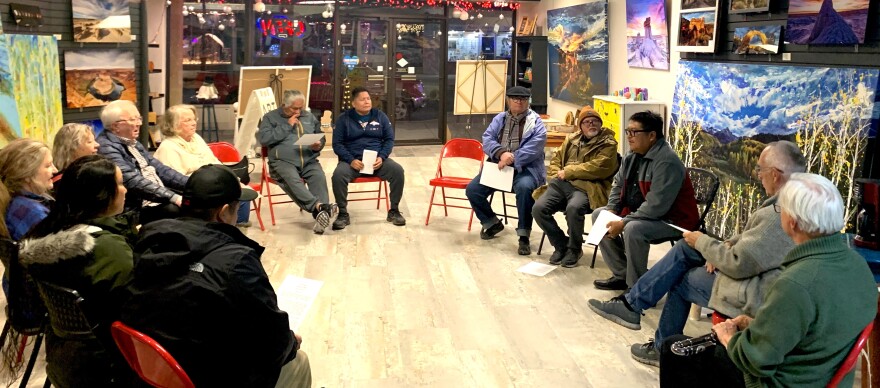As the sun set on a Wednesday in Farmington, New Mexico, community members gathered in an art gallery to hear Delbert Anderson discuss the Long Walk of the Navajo and his composition, remembering the tragic event. That night, musicians joined Anderson to perform a single note — a concert D sustained for 30 seconds.
In Anderson’s The Long Walk, a single note comes every few months, and the duration of the piece is 1,674 days. That’s the length of time Navajo people were forced from their homeland in the 1860s by the U.S. government.
The idea came about a few years ago when Anderson was having dinner with a musician friend north of San Francisco. The conversation turned toward the use of silence in musical compositions.
“It was a sushi spot. We were waiting on a table, talking about different compositions, and the idea of silence came about,” Anderson said. “He brought up John Cage, and we talked about his famous piece, the silent piece, 4′33″”
4′33″ is among the most famous works by 20th-century composer John Cage. In the piece, the performing musicians sit at concert rest, poised to play their instruments but never doing so.

As Anderson and his friend waited for a table, they riffed on John Cage’s use of silence.
“There's this other piece, it's like 600 years long, and I thought, ‘Whoa, that's pretty cool.’ I never knew about that.”
The 639-year-long piece is called As Slow As Possible. It’s a series of notes performed over centuries with intermittent periods of silence lasting months. This performance outlives the performers.
“I just thought it was the coolest thing,” said Anderson, “Wow, 600 years, and you're only going to be there 70 to 100 years of this composition alive… I want to do a piece that's long, but within someone's lifetime,” said Anderson.
In November 2023, Anderson launched a performance of a piece he calls The Long Walk. The piece is short compared to the Cage work that inspired it. Anderson’s piece is a total of 50 notes played over four and a half years. However, Cage focused on conceptual abstractions of sound and time, and Anderson has woven cultural history into his composition.
In his research, Anderson learned Navajo people were malnourished and weren’t clothed appropriately.
“We thought it was just kind of a march, that they were well taken care of, and they eventually got sent back home, so what's the big deal? But when I started seeing how our ancestors were treated, it was mind-blowing,” said Anderson.
Soldiers forced Navajo people to walk 450 miles to an internment camp in New Mexico. During some periods, 20-30 starved each week. These are the details performers and audience members consider in the moments before the note is played.

Anderson led the musicians into the note.
“Let's get ready, 1, 2, 3, and…”
The five musicians' played the D note on trumpets, a trombone, and a flute for about 30 seconds. As the musicians held the note, community members reflected on a history that’s more than a hundred years old.
Following the note, there was silence for some time.
Sam Bader is a trombonist and a Native Hawaiian who lives in Farmington.
“When I played that concert D on my trombone, I just felt echoes of like generations of ancestors,” said Bader. “It was spiritually very grounding. I really felt it in the silence after I played. I played the note, and then there was that silence… I had to close my eyes and just sit and think with it for a little bit.”
The 50th and final note will be performed on June 1st, 2028. In the intervening time, several dozen additional notes will be played. Between each of those notes, there are periods of silence—silence that reminds us of the deprivations and uncertainties Navajo people faced during their Long Walk in the 1860s.
This story is part of Voices From the Edge of the Colorado Plateau. Voices is a reporting collaboration between KSUT Public Radio and KSJD Community Radio. It seeks to cover underrepresented communities in the Four Corners. The multi-year project will cover Native, Indigenous, Latino/Latina, and other communities across southwest Colorado.
Explore more Voices From the Edge of the Colorado Plateau stories.
Copyright 2024 Four Corners Public Radio. To see more, visit Four Corners Public Radio.









